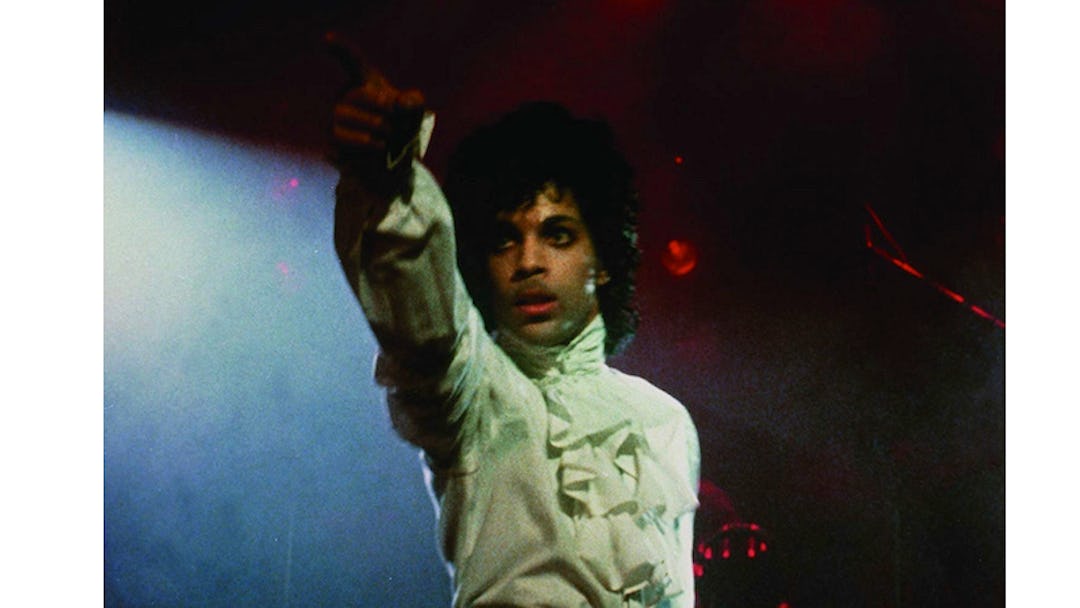When I heard of Prince’s death yesterday, my initial reaction was the same as many people’s: disbelief, confusion, shock. TMZ had been wrong before, about Lil Wayne, and surely they had to be wrong this time — Prince wasn’t even 60, and had always seemed in rude health, his recent encounter with the flu notwithstanding.
When it became clear the news was true, though, the thought that struck me was a strange one, one that seemed like it wasn’t my own, one that didn’t even really make sense: “Prince was the opposite of death.”
Growing up in the ’80s, Prince was the sort of ubiquitous that demanded an opinion, even if you didn’t consider yourself a dyed-in-the-wool fan. I was never a huuuuuuge fan because to me, fandom meant identifying with the object of your worship, and it seemed impossible to feel close to Prince — he seemed so outlandish, so distant from my experience and my life, that all you could do was sort of stare in wonder at the fantastical creature in the assless chaps and platform boots. Being a superfan seemed like pledging your love for the moon or the stars. Of course, this was part of his appeal — as writer Jeremy D. Larson wrote in a wonderful Prince tribute posted on Facebook last night, “I loved that he orbited around me, voguing in this forbidden space only he should occupy. Too close and you get the wag of a finger and a pursed smile.”
Prince, Michael Jackson, Madonna: these were the three pillars upon which the edifice of pop music rested in the ’80s, and who was “better” of Prince and Michael was a popular schoolyard debate, albeit one whose terms were, of course, entirely subjective. And now both of them are dead. But while Jackson seemed all too human toward the end, a fragile, broken, sad person whose death seemed as inevitable as it was tragic, Prince was the opposite. He seemed more than human. Not superhuman, just… something different.
Like David Bowie, another superlative talent who 2016 has taken from us far too early, it seemed impossible to imagine him doing normal things. Just like it seemed silly to imagine David Bowie shopping for groceries, it seemed silly to imagine Prince, I don’t know, doing his laundry. Or playing basketball. Or riding a bicycle. Or dying.
The shock is all the greater because no-one saw it coming — Prince’s genius never faded, and the only thing that seemed to be standing between him and a return his ’80s heyday was himself: the love symbol, the battles with Warner Bros, the way he insisted on doing things like releasing albums via Sunday tabloids. And even then, he was perfectly capable of just casually dropping a brilliant single like “Black Sweat,” out of nowhere, just to remind everyone that hey, he was still Prince. His live performances were legendary, and it will be one of my eternal regrets that I never got to see one. He never seemed to age. He was just… Prince.
His music seemed to appreciate and draw from as wide a variety of sounds as possible — at various times he channeled funk, disco, rock ‘n’ roll, rap, anything and everything, sometimes minimalist, sometimes maximalist, as ready to cover Radiohead as he was to tear through “Controversy” or “I Would Die 4 U” or “When Doves Cry.” And in the same way, his vision of the world was one of revolutionary fluidity, a place where a man could turn up to his first appearance on national TV wearing outrageous zebra print underpants and thigh-high boots, a place where gender and sexuality seemed concepts as outmoded as race and class.
The Guardian’s Steven W Thrasher wrote yesterday about how Prince overturned every concept of what a black man should be, and his point that “Prince was a paradox in that he expanded the concept of what it meant to be a man while also deconstructing the entire idea of gender” is spot on; clearly, as a white man I can’t comment on what Prince meant to black masculinity, but his power to challenge and inspire conceptions of manhood was universal.
I remember feeling challenged and somewhat disconcerted by Prince as a child; for whatever reason, as a kid, I liked to be able to categorize things, and Prince’s very existence seemed to invalidate the entire concept of categories. And also, of course, I fancied him, because who didn’t fancy Prince? He was filthy cute, and baby, he knew it. For all that, Prince was never evangelical about these aspects of his approach to life. (He was very evangelical about religion at various points, which only goes to show what a mass of fascinating contradictions the man was.) His approach to love and sex was as playful as it was irresistible.
As writer and journalist Sady Doyle wrote on Twitter,
This is totally on point, and it’s true because sex is ridiculous and life is ridiculous and both of them are beautiful in their absurdity.
A friend said on Facebook yesterday, in all caps, that “THE ONLY THING WE CAN DO FOR THE REST OF THE YEAR IS BE AS SEXY AS POSSIBLE.” I chuckled at the comment when she posted it, and shared it with my friends, but the more I think about it, the more I think she’s 100% on point. What is the opposite of death? Living. Not just being alive. Living. Loving. Fucking. Laughing. And doing it again in the morning,
And god, if Prince’s music is about anything, it’s about that. “Life is just a party,” he sang on “1999,” “and parties weren’t meant 2 last.” But that only makes them more precious, right?
